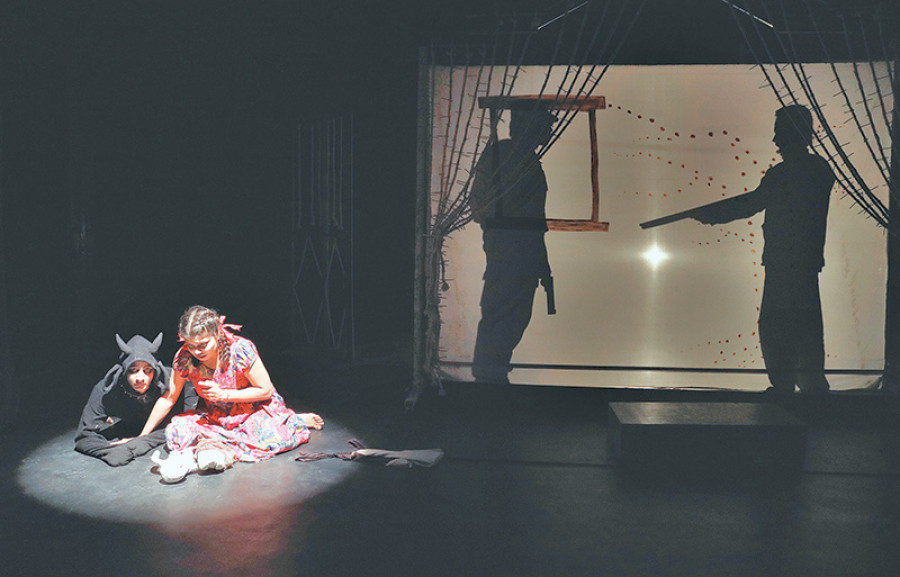Miscellaneous
Scratching the surface
In this decade of tenuous post-insurgency ‘peace’, several attempts have been made through literature, films, theatre and academic research to explore the impact of the ‘People’s War’ on Nepal. Given that a long period of time has not passed since the end of the war; given that the transitional justice issues have not been addressed and that the memories still linger fresh in the national psyche, there is no definitive view on how the civil war shaped the fabric of Nepali society. No doubt, eventually, a definitive narrative will emerge; but in the meantime, productions like Sakhi, for better or worse, will continue to add and shape perspectives.
Sandesh Ghimire
In this decade of tenuous post-insurgency ‘peace’, several attempts have been made through literature, films, theatre and academic research to explore the impact of the ‘People’s War’ on Nepal. Given that a long period of time has not passed since the end of the war; given that the transitional justice issues have not been addressed and that the memories still linger fresh in the national psyche, there is no definitive view on how the civil war shaped the fabric of Nepali society. No doubt, eventually, a definitive narrative will emerge; but in the meantime, productions like Sakhi, for better or worse, will continue to add and shape perspectives.
At its heart, Sakhi, which is currently ongoing at Shilpee Theatre in the Capital, reiterates that when said and done, it was the common people who bore the brunt of the civil war. This by no means is a fresh take on the decade-long insurgency, but could this recounting explore it in a new way?
The play Sakhi is set during the peak of the war, when both the warring sides have upped the ante, trapping an uninvolved family and their neighbour in between. The family speaks only Maithili, which becomes fatal when the father is caught taking cover when the army are searching for insurgents in the village. Unable to explain in Nepali that he is only a commoner, the father is taken away—the idea that it was the voiceless that suffered the most during the war takes on a figurative as well as a literal meaning. Similarly, the Maoists descend onto the village next and forcefully recruit the son among their ranks; eventually letting him go when the family buy his freedom with their neighbour’s beloved pet goat, Sakhi.
On paper, Sakhi, the play, has all the right ingredients to bring the message home. It has a solid plot to work with and plenty of potential themes to explore between the lines. However, that potentially powerful story is undercut by the tepid execution of the play.
The first stumbling block for the play is that it is central for its premise that the leading characters speak only in Maithali. As a result, the audience who do not have a grasp over the language have to rely on the physical movements of the actors and on cognate words to decipher what is transpiring on stage. This could have been equally powerful had the performances hit the mark, but, apart from the rare moment, it is nothing to write home about.
And then, just like that, the play oscillates to the other extreme by suddenly being too verbose. For a play that tells the story of the ‘voiceless’ people within Nepal’s hegemonic structure, the exchanges tend to be winded when it could have been succinct, petering out the impact of the story. For instance, after Sakhi is taken away, the owner is in great pain. A kind of pain that is irreducible. But when the pet owner starts describing the fate that is in store for the goat, her pain seems half-hearted. In such moments, it would have been perhaps a wiser choice to let the actor physically react to the pain. When in pain, a person is in shock and depending on the individual, the pain can manifest in a hundred different ways, but not with words—at least not in contrived soliloquys.
The symptoms of the plot going awry are present from the very beginning. For the first five minutes of Sakhi, the audience hears reports after reports of escalating encounters between the rebel forces and the state. After which we see a group of Maoist singing a folk tune that has been retrofitted to fit their agendas. Then there is another vignette where an Army captain commands his battalion to stop the rebels, followed by the singing of an ultranationalist song. By the time the family on whom the story revolves arrives on stage, the audience’s attention is already wandering. Hence, when the dramatic tension kicks in, it feels like a rain in the desert; albeit short lived. When those moments of conflict arrive—when the people become collateral in a war—the play begins to depict a rarely seen sight of the war, but Sakhi, by neither being histrionic or realistic, undermines its own potential. At its best, Sakhi is a good example of un-rigorous storytelling. It keeps us hanging and makes us wish: What if the play was short but forceful, what if so and so scenes were omitted to make room for so and so.
When you walk out of the theatre, there is no room to rejoice or lament. After all, there were the rare moments of lucidity in the play which will make you feel that your money and time was not wasted. But ultimately, the time spent at the theater fails to leave a memorable mark.
Sahki’s final two shows are being staged at Shilpee Theatre in Battisputali today.




 22.37°C Kathmandu
22.37°C Kathmandu










